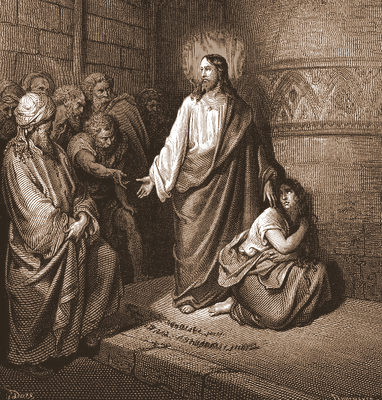Which of you convicts me of sin? If I tell the truth, why do you not believe me? Whoever is from God hears the words of God. The reason you do not hear them is that you are not from God." The Jews answered him, "Are we not right in saying that you are a Samaritan and have a demon?" Jesus answered, "I do not have a demon; but I honor my Father, and you dishonor me. Yet I do not seek my own glory; there is one who seeks it and he is the judge. Very truly, I tell you, whoever keeps my word will never see death." The Jews said to him, "Now we know that you have a demon. Abraham died, and so did the prophets; yet you say, 'Whoever keeps my word will never taste death.' Are you greater than our father Abraham, who died? The prophets also died. Who do you claim to be?" Jesus answered, "If I glorify myself, my glory is nothing. It is my Father who glorifies me, he of whom you say, 'He is our God,' though you do not know him. But I know him; if I would say that I do not know him, I would be a liar like you. But I do know him and I keep his word. Your ancestor Abraham rejoiced that he would see my day; he saw it and was glad." Then the Jews said to him, "You are not yet fifty years old, and have you seen Abraham?" Jesus said to them, "Very truly, I tell you, before Abraham was, I am." So they picked up stones to throw at him, but Jesus hid himself and went out of the temple.

Again, we leave our weekly progression through Mark and we take a detour into the Gospel according to John. Today we are faced with Jesus being confronted again by the “Jews” who wish to convict him of blasphemy. The daily lectionary repeats the exact reading that we heard on February 11, 2012; give or take a verse. The idea that gets my attention today is that they call Jesus a Samaritan, which is ironic because Samaritans do not believe in the resurrection (and Jesus rises from the dead).
The questions continue about the identity of Jesus, and about where his power and abilities come from. They have now come to the conclusion that Jesus must have a demon. Jesus tries to explain that his abilities and his glory comes only from God, and that God is the source of all and the judge of all. Jesus tries to explain his connection to God by telling them that he was before Abraham.
The call that I hear today is “be a keeper of the Word.” Jesus says that whoever keeps his word will never taste death. Therefore, everlasting life is the reward of being a “keeper of the Word.” How do we keep the Word of God, which we know to be Jesus the Christ? We keep him in faith and practice. We keep him in trust for others. To be keepers of the word, we need to be a sharer of the word. In order to do this, I suggest that we live as St. Francis suggested, “preach the Gospel at all times. When necessary, use words!”


